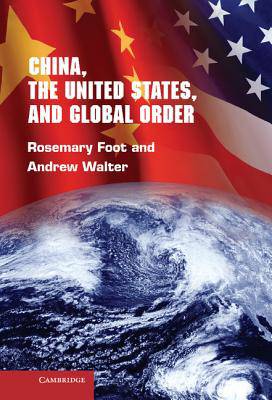
- Afhalen na 1 uur in een winkel met voorraad
- Gratis thuislevering in België vanaf € 30
- Ruim aanbod met 7 miljoen producten
- Afhalen na 1 uur in een winkel met voorraad
- Gratis thuislevering in België vanaf € 30
- Ruim aanbod met 7 miljoen producten
Zoeken
€ 158,95
+ 317 punten
Uitvoering
Omschrijving
The United States and China are the two most important states in the international system and are crucial to the evolution of global order. Both recognize each other as vital players in a range of issues of global significance, including the use of force, macroeconomic policy, nonproliferation of nuclear weapons, climate change, and financial regulation. In this book, Rosemary Foot and Andrew Walter, both experts in the fields of international relations and the East Asian region, explore the relationship of the two countries to these global order issues since 1945. They ask whether the behaviour of each country is consistent with global order norms, and which domestic and international factors shape this behaviour. They investigate how the bilateral relationship of the United States and China influences the stances that each country takes. They also assess the global implications of national decisions, coming to the sobering conclusion that China and the United States tend to constrain rather than encourage more cooperative solutions to key global challenges. This is a sophisticated analysis that adroitly engages the historical, theoretical, and policy literature.
Specificaties
Betrokkenen
- Auteur(s):
- Uitgeverij:
Inhoud
- Aantal bladzijden:
- 354
- Taal:
- Engels
Eigenschappen
- Productcode (EAN):
- 9780521898003
- Verschijningsdatum:
- 20/12/2010
- Uitvoering:
- Hardcover
- Formaat:
- Ongenaaid / garenloos gebonden
- Afmetingen:
- 157 mm x 231 mm
- Gewicht:
- 589 g

Alleen bij Standaard Boekhandel
+ 317 punten op je klantenkaart van Standaard Boekhandel
Beoordelingen
We publiceren alleen reviews die voldoen aan de voorwaarden voor reviews. Bekijk onze voorwaarden voor reviews.











